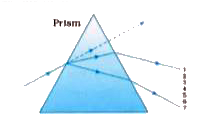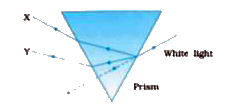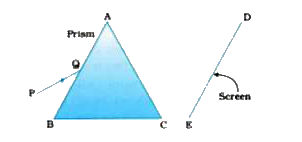Complete Solutions to Practical Skill Based Questions with Answers of chapter THE HUMAN EYE AND THE COLOURFUL WORLD of Class 10 book with complete answers and questions
| Class 10 | PHYSICS |
| Chapter | THE HUMAN EYE AND THE COLOURFUL WORLD |
| KUMAR PRAKASHAN | Practical Skill Based Questions with Answers |
| Number Of Questions | 5 |
| Academic Year | 2023-24 |
Dispersion is caused by refraction and not by reflection. Why?
01:23View SolutionA beam of white light falling on a glass prism gets split up into seven colours marked 1 to 7 as shown in the diagram.

(1) The colours at positions marked 3 and 5 are similar to the colour of the sky and the colour of gold (metal), respectively. Is the above statement made by a student correct or incorrect. Justify.
(2) Which of the positions shown above correspond approximately to the colour of (a) a brinjal, (b) danger signal, (c) neel (Lll) (applied to clothes), (d) orange.03:37View SolutionWhen a beam of white light is passed through a triangular glass prism, it gets dispersed into its component colours. Why do we get these colours ? In the given figure, the colours X and Y represent the extreme components of the spectrum. Identify X and Y.
 01:37View Solution
01:37View SolutionA narrow beam PQ of white light passes through a glass prism ABC as shown in the diagram.

Trace it on your answer sheet and show the path of the emergent beam as observed on the screen DE.
(1) Write the name and cause of the phenomenon observed.
(2) Where else in nature is this phenomenon observed ?
(3) Based on this observation, state the conclusion which can be drawn about the constituents of white light.02:58View Solution(a) A narrow beam of white light is incident on three glass objects as shown below. Comment on the nature of the behaviour of the emergent beam in all three cases.

(b) There is a similarity between two of the emergent beams. Identify the two.03:30View Solution
Practical Skill Based Questions with Answers questions and complete solutions for chapter THE HUMAN EYE AND THE COLOURFUL WORLD of KUMAR PRAKASHAN of Class 10
All Exercises from KUMAR PRAKASHAN Class 10 PHYSICS THE HUMAN EYE AND THE COLOURFUL WORLD
- ADDITIONAL QUESTIONS AND ANSWERS
- OBJECTIVE QUESTIONS AND ANSWERS
- OBJECTIVE QUESTIONS AND ANSWERS (Answer the following questions in very short as directed (Miscellaneous) )
- OBJECTIVE QUESTIONS AND ANSWERS (Choose the correct option)
- OBJECTIVE QUESTIONS AND ANSWERS(Answer the following questions in one word / sentence)
- OBJECTIVE QUESTIONS AND ANSWERS(Fill in the blanks)
- OBJECTIVE QUESTIONS AND ANSWERS(State whether the following statements are true or false)
- Practical Skill Based Questions with Answers
- QUESTIONS AND ANSWERS
- TEXTUAL EXERCISE
- Value Based Questions With Answers
